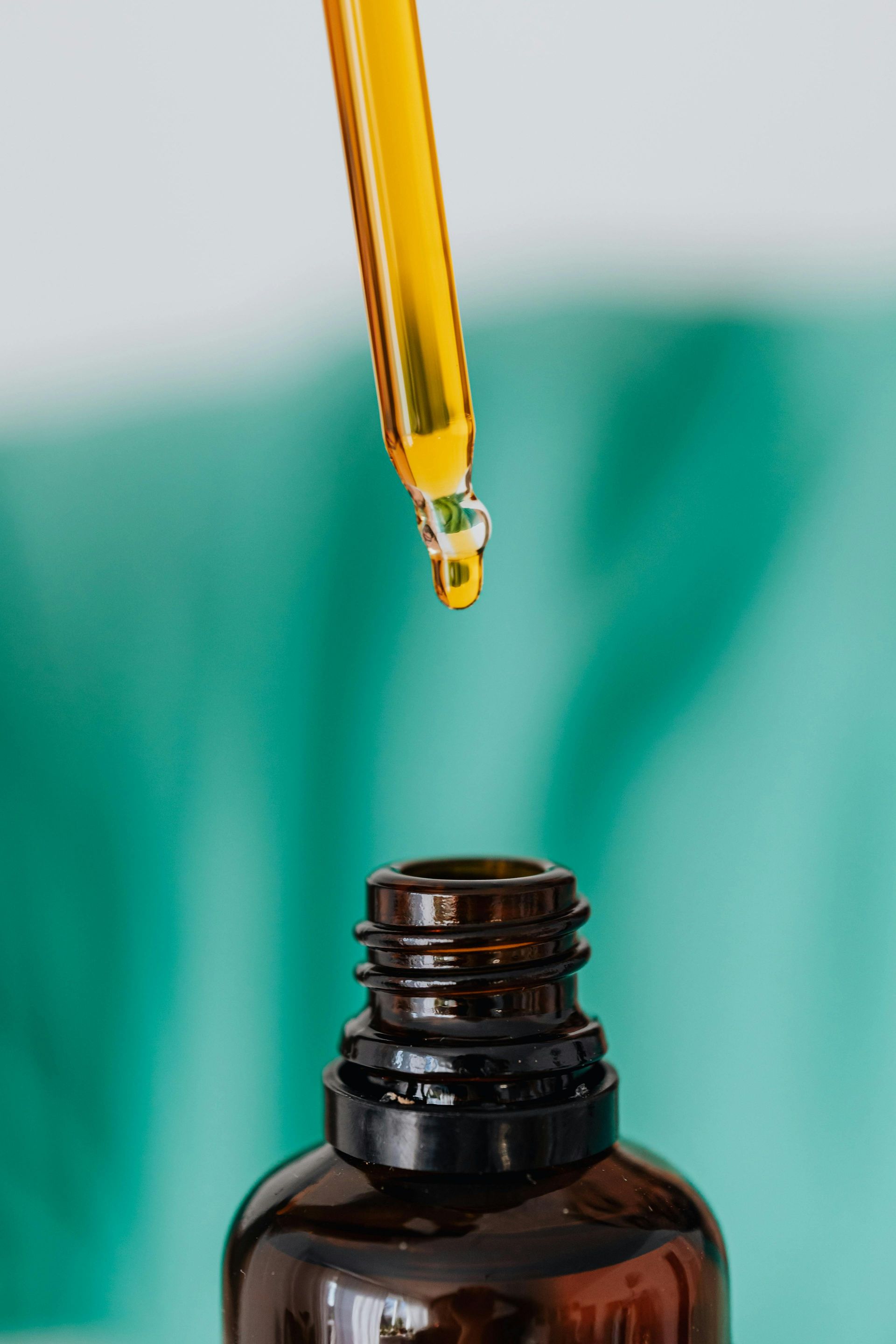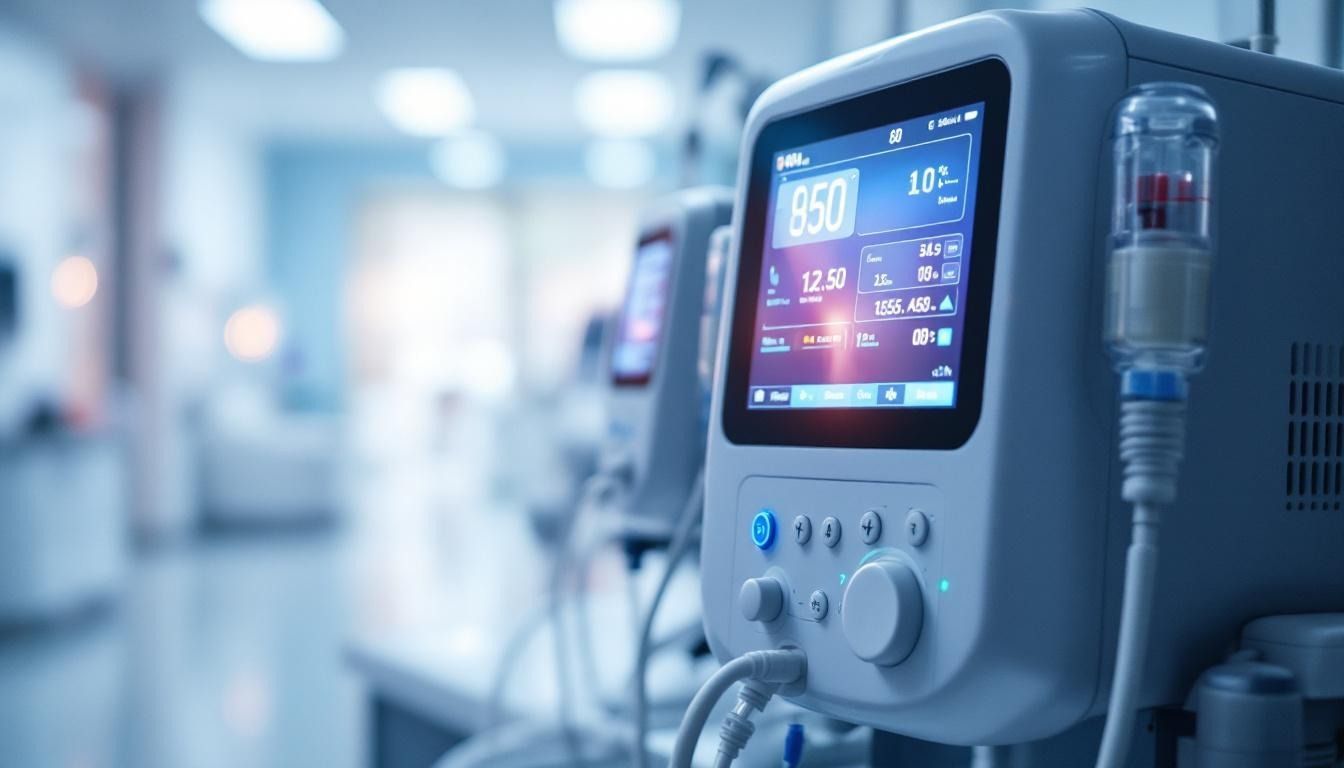Choosing TPN for digestive issues
Exploring Total Parenteral Nutrition
Total Parenteral Nutrition (TPN) emerges as a vital option for patients whose digestive systems fail to function adequately. This feeding system offers essential nutrition directly into the bloodstream, bypassing the customary dietary intake process. Utilized in cases such as severe pancreatitis, bowel obstructions, or following major surgeries, TPN not only sustains life but allows critical recovery time for impaired gastrointestinal systems. This article delves into various aspects of TPN including its indication, administration, composition, risks, and how it compares to other feeding techniques.
What is Total Parenteral Nutrition (TPN)?
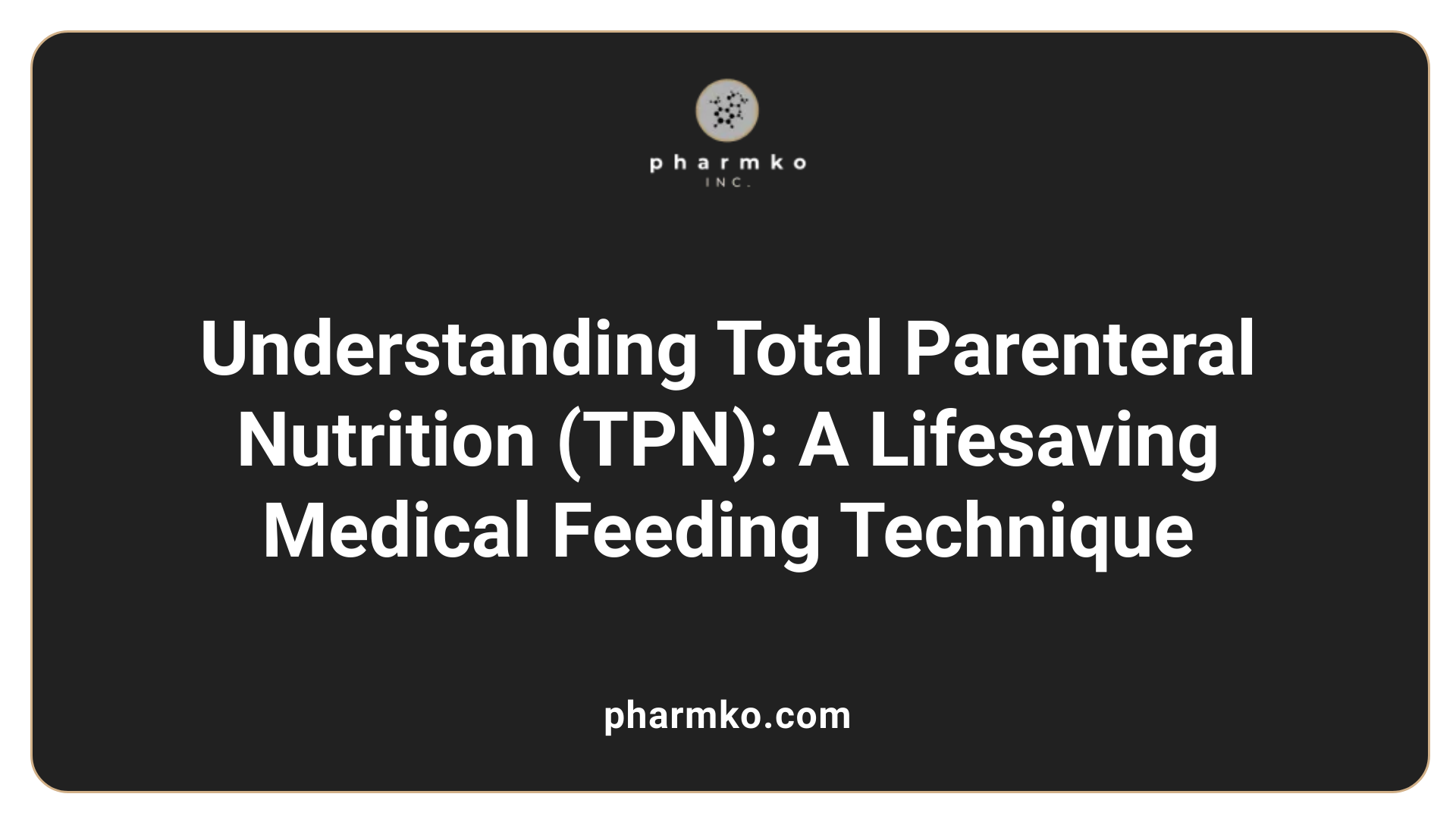
Definition of TPN
Total Parenteral Nutrition (TPN) is a medical feeding technique used to deliver essential nutrients directly into the bloodstream through a central vein. This method is crucial for patients who cannot intake or digest food via the gastrointestinal tract due to various medical conditions.
How TPN bypasses the digestive system
TPN is designed to completely bypass the digestive system, making it a vital solution for individuals with severe bowel conditions, tissue injuries, or during specific treatments like chemotherapy. By infusing nutrients such as carbohydrates, proteins, and fats directly into the bloodstream, TPN provides the necessary sustenance while allowing the digestive system to rest and heal.
Administration of nutrients through veins
The administration of TPN is performed via a central venous catheter (CVC), which can be placed in major veins around the heart. It is essential for patients to understand the process of administering TPN, which includes diligent care of the catheter to prevent infections and ensure sterile conditions. Regular monitoring is required to adjust the nutritional formula based on laboratory assessments and the patient's condition, emphasizing the need for extensive education and support from healthcare teams.
TPN can be a life-saving intervention for those requiring complete nutritional support, and its proper management is crucial for patient health and recovery.
Indications for TPN Use
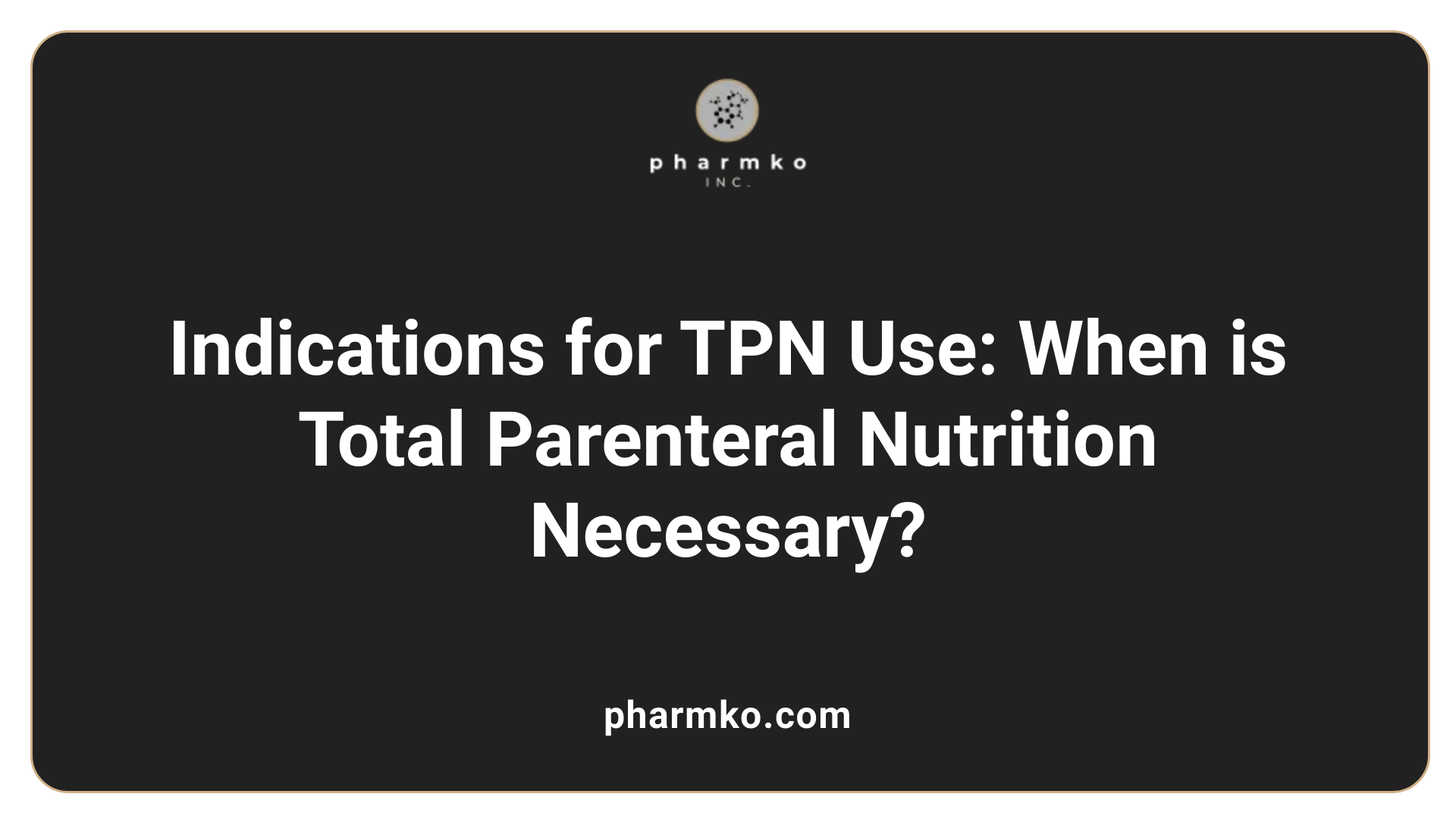
When is Total Parenteral Nutrition (TPN) indicated for use?
Total Parenteral Nutrition (TPN) is indicated for patients who are unable to receive adequate nutrition through the gastrointestinal tract due to various medical conditions. Some of these conditions include:
- Bowel Obstructions : Chronic intestinal blockages that prevent the passage of food.
- Short Bowel Syndrome : A condition where a significant portion of the small intestine has been removed or is dysfunctional, impeding nutrient absorption.
- Trauma or Surgery : Post-operative recovery from extensive digestive surgery or abdominal trauma that necessitates bowel rest.
- Pancreatitis : An inflammation of the pancreas that can interfere with normal digestive function.
- Cancer Treatment : Patients undergoing chemotherapy might not tolerate normal feeding due to side effects.
Additionally, TPN may be necessary for infants who are extremely premature and cannot feed normally, providing them with essential nutrients intravenously.
When is TPN contraindicated?
While TPN can be life-saving, it is not suitable for everyone. Contraindications include:
- Functional Gastrointestinal Tract : Patients with a functioning digestive system should receive enteral nutrition instead.
- Expected Short-term Need : If a patient's nutritional needs can be met in less than five days without severe malnutrition, TPN is generally not indicated.
- Severe Infections : Patients with severe infections, such as sepsis, may find TPN harmful due to its potential to suppress the immune system.
Understanding when TPN is indicated or contraindicated is essential to optimizing patient care and outcomes.
Nutritional Composition of TPN
What are the nutritional components of TPN?
Total Parenteral Nutrition (TPN) delivers vital nutrients directly to individuals who cannot benefit from traditional eating due to digestive complications. The solutions typically contain three primary macronutrients:
- Carbohydrates : Primarily sourced from dextrose, carbohydrates make up about 60% to 70% of the total calories in TPN, providing essential energy.
- Proteins : In the form of amino acids, proteins account for roughly 2% to 15% of the calories, crucial for tissue repair and maintenance.
- Fats : Lipid emulsions contribute 25% to 40% of TPN calories, supplying essential fatty acids and aiding in vitamin absorption.
In addition to these macronutrients, TPN solutions also include:
- Water : Making up 70% to 85% of the solution, hydration is vital for overall health and nutrient transport.
- Micronutrients : Vitamins, minerals, and trace elements tailored to individual needs ensure comprehensive nutritional support.
Adjustments based on patient needs
Monitoring and adjusting TPN components is essential to meet specific patient requirements. Factors influencing these adjustments include:
- Patient's condition : Requirements may vary based on illness or recovery progress.
- Lab results : Regular blood tests help track metabolic parameters and electrolyte balance.
- Age and gender : Nutritional needs differ among populations, affecting individualized formulations.
Tailored TPN forms a crucial part of the treatment plan, ensuring patients receive adequate nutrition while minimizing complications that could arise from improper nutrient ratios. Their care team plays a key role in managing these adjustments effectively.
Administering TPN
How is Total Parenteral Nutrition (TPN) administered?
Total Parenteral Nutrition (TPN) is administered intravenously, often through a central venous catheter (CVC). This method is crucial due to the high osmolarity of TPN solutions that can cause damage to peripheral veins if infused that way. The process involves a carefully formulated solution containing carbohydrates, proteins, fats, vitamins, and minerals, all tailored to meet the patient's individual nutritional requirements.
To ensure proper nutrient delivery, clinicians must follow strict dosing guidelines, regularly adjusting TPN formulations based on laboratory results and the metabolic needs of the patient. Monitoring for complications is essential, as patients can face risks such as hyperglycemia, metabolic imbalances, and refeeding syndrome. Regular assessments help guide necessary adjustments in TPN composition to prevent nutrient deficiencies while providing comprehensive nutritional support.
Role of Central Venous Catheter
The central venous catheter plays a vital role in the administration of TPN. It is inserted into a large vein, allowing the infusion of nutrient-rich solutions directly into the bloodstream. This method facilitates a stable and consistent flow of TPN, ensuring that patients receive the necessary calories and nutrients without taxing their digestive systems.
Utilizing either a tunneled catheter or an implanted port minimizes the risk of infection, which is crucial for patients who rely on TPN for extended periods. By bypassing the gastrointestinal tract, TPN via CVC becomes a critical therapeutic option for patients unable to process food due to severe digestive issues.
| TPN Administration Components | Function | Importance |
|---|---|---|
| Central Venous Catheter | Delivers TPN to bloodstream | Prevents peripheral vein damage |
| Nutrient Solution | Provides essential nutrients | Tailored to individual needs |
| Monitoring | Tracks patient’s metabolic state | Prevents complications |
Potential Complications of TPN
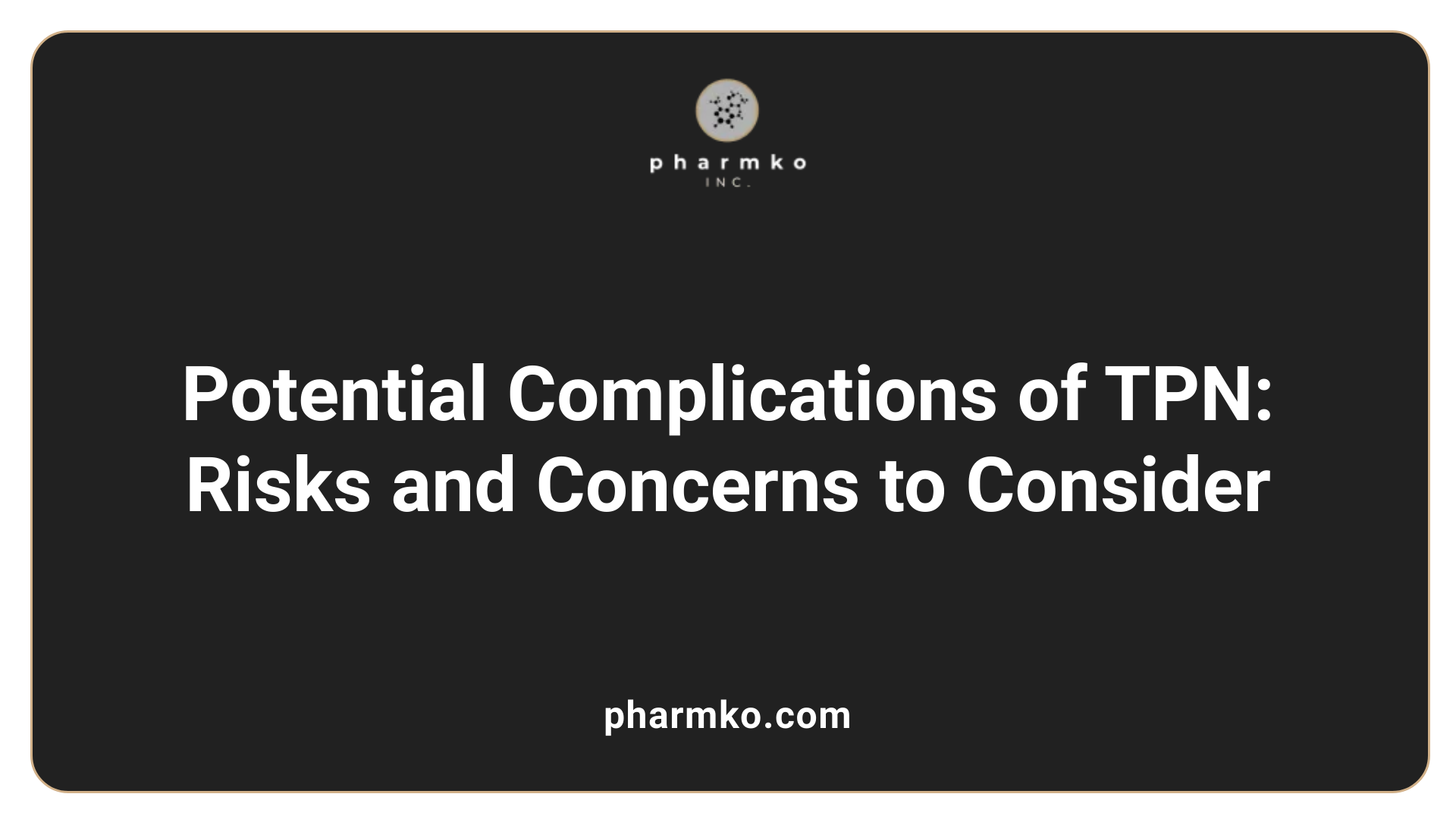
What are the potential complications and side effects of TPN?
Total parenteral nutrition (TPN) is a critical lifesaving treatment, yet it carries potential complications. One notable concern is the risk of infections, particularly central line-associated bloodstream infections, due to the catheter used for nutrient delivery. Effective infection control measures are essential to mitigate this risk.
Metabolic issues also arise during TPN administration, including refeeding syndrome, hyperglycemia, and hypertriglyceridemia. Refeeding syndrome can be particularly dangerous and may develop within 24 to 48 hours after initiating TPN, especially in malnourished patients. Consequently, close monitoring of metabolic parameters is vital.
Long-term TPN use has additional risks such as liver dysfunction, with conditions like fatty liver and gallbladder disease becoming prevalent. Moreover, patients may experience metabolic bone disease, leading to conditions like osteoporosis and osteomalacia over time.
Furthermore, catheter-related complications, including occlusions and blood clots, highlight the importance of vigilant management and monitoring. Regular assessments by clinical nutrition teams are crucial to minimizing these risks and enhancing patient safety.
Benefits of TPN for Digestive Health
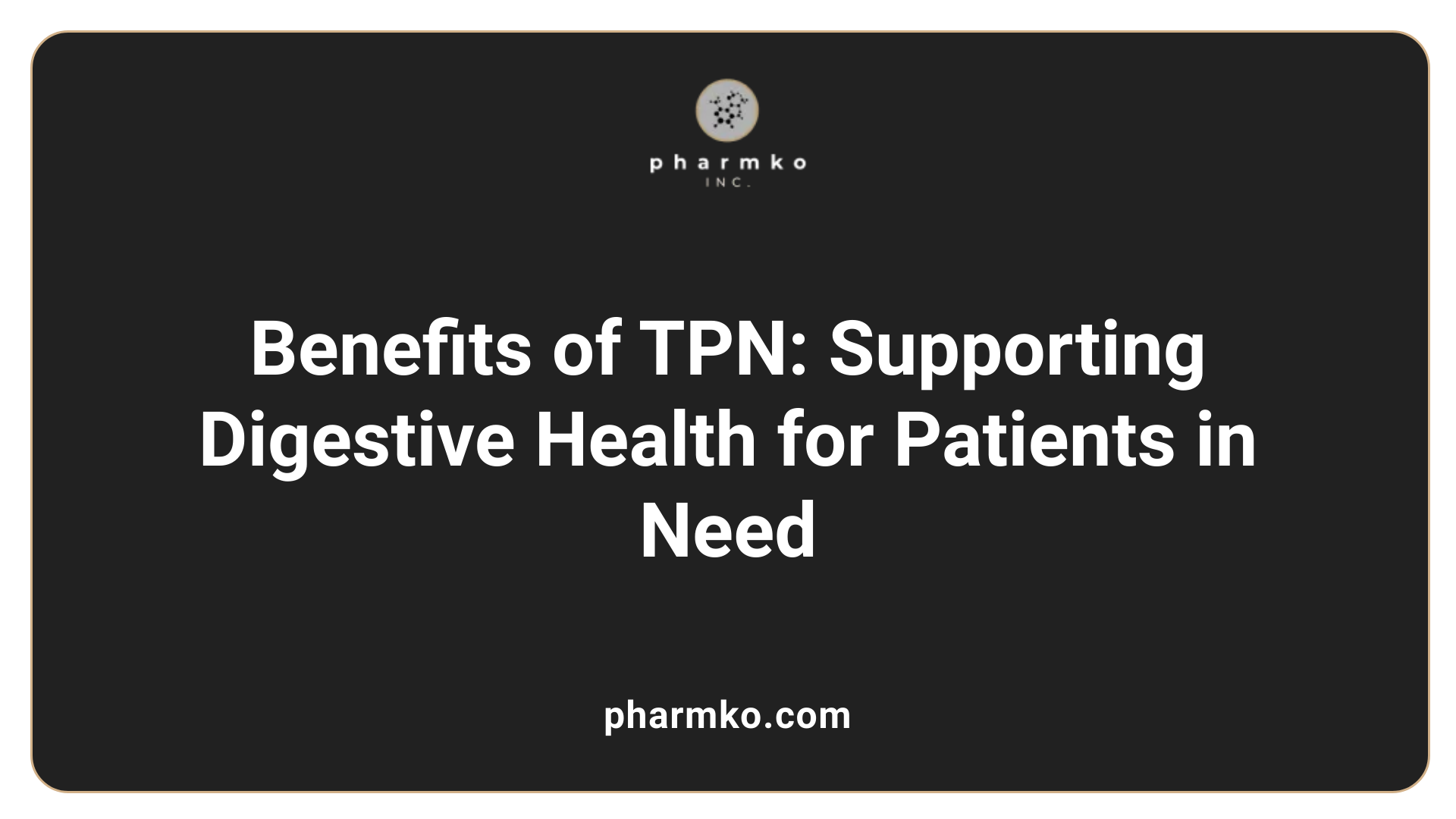
What are the benefits of TPN for patients with severe digestive issues?
Total parenteral nutrition (TPN) offers critical benefits for patients with severe digestive issues by providing complete nutrition directly into the bloodstream, bypassing the digestive system. This form of feeding is essential for individuals with conditions such as:
- Short bowel syndrome : Patients have reduced intestinal surface area, limiting nutrient absorption.
- Chronic intestinal obstruction : TPN allows the bowel to rest and heal.
- Post-operative recovery : Following major surgeries, TPN enables proper nutrient delivery when oral feeding isn’t feasible.
By delivering a tailored mixture of macronutrients—carbohydrates, amino acids, and fats—TPN plays a pivotal role in managing malnourishment when oral or enteral feeding cannot meet nutritional needs. This method is particularly beneficial for malnourished patients, including extremely premature infants, ensuring they achieve the necessary growth and development during critical periods.
While TPN does carry some risks, such as infections and metabolic imbalances, it can be safely administered by experienced medical teams. Thus, TPN remains a vital therapeutic option for patients with impaired gastrointestinal function, offering life-saving nutrition that supports recovery and health.
Patient groups who benefit most
- Infants and children with gastrointestinal disorders: TPN supports growth during critical developmental stages.
- Patients with severe malnutrition: TPN addresses immediate nutritional needs while the gastrointestinal system is compromised.
- Individuals recovering from surgery or trauma: Ensure proper nutrition to facilitate healing.
Healthcare Provider Role in TPN Therapy
What role do healthcare providers play in TPN therapy?
Healthcare providers play a vital role in the management of Total Parenteral Nutrition (TPN) therapy by carefully assessing patients' nutritional needs and formulating tailored treatment plans. These assessments include reviewing patients' medical histories and lab results to ensure a comprehensive understanding of their health profiles.
An interprofessional team involving pharmacists, dieticians, and nurses is essential for the safe preparation and delivery of TPN. Providers oversee the sterile administration of TPN, monitoring patients meticulously for potential complications such as infections, metabolic imbalances, and nutrient deficiencies. This involves routine assessments and blood tests to track the patient’s progress and necessary adjustments to the TPN solution.
Education plays a significant role, as healthcare providers instruct patients on how to care for their central venous catheters and emphasize the importance of maintaining sterile techniques during administration.
What are the ethical considerations surrounding TPN therapy?
TPN therapy also poses ethical considerations. Providers must navigate the complex decisions regarding the initiation and potential withdrawal of TPN. This involves ensuring that patients and their families are informed and engaged in discussions about the benefits and risks of TPN, as well as addressing their personal values and wishes regarding end-of-life care. Clear communication is crucial to ensure that all decisions are made collaboratively and align with the patient’s best interests.
Ultimately, healthcare providers have a multifaceted role in TPN therapy, balancing clinical management with ethical counseling to enhance patient care.
TPN vs. Tube Feeding: A Comparative Look
How does TPN compare to tube feeding?
Total Parenteral Nutrition (TPN) and tube feeding, also known as enteral nutrition, are both essential methods for delivering nutrients to those unable to eat normally. The key difference lies in how these methodologies operate:
-
Method of Delivery
- TPN : Administered intravenously, TPN bypasses the gastrointestinal (GI) tract entirely, making it suitable for individuals with severe digestive ailments or for those who cannot absorb nutrients due to conditions like Crohn's disease or post-surgery requirements.
- Tube Feeding : This method involves delivering nutrients directly into the stomach or small intestine via a tube. It is generally utilized when the GI system remains functional, making it appropriate for patients with swallowing difficulties (dysphagia).
-
Tolerability and Risks
- Enteral nutrition is typically better tolerated by patients, less expensive, and poses fewer risks, particularly concerning infections. Since feeding occurs through the GI tract, it supports the immune system and maintains gut integrity.
- Conversely , TPN may lead to complications such as catheter-related infections and metabolic imbalances.
Overall, when feasible, enteral nutrition is preferred as it promotes gastrointestinal health while providing essential nutrients. However, in cases where the GI tract is not functional, TPN offers a critical alternative for nutritional support.
Key Considerations for TPN Use
What considerations should be made when using TPN?
When utilizing Total Parenteral Nutrition (TPN), several critical considerations come into play to ensure safety and efficacy. Proper line placement and maintenance are paramount, as infections are significant risks associated with TPN. Healthcare providers must employ strict sterile protocols during catheter insertion and throughout the duration of therapy.
Solution Composition and Monitoring
The composition of the TPN solution is tailored to the individual patient based on their specific nutritional needs. It is essential to include the right balance of macronutrients: carbohydrates (for energy), protein (for tissue repair), and lipids (for calorie provision). Regular monitoring of blood sugar levels is vital to prevent hyperglycemia and hypoglycemia, while checking electrolytes, vitamins, and minerals prevents imbalances that could lead to serious complications.
Patient-Specific Factors
Patient-specific factors, including age, weight, medical history, and current health status, also play a significant role in determining TPN protocols. Regular assessments help adapt nutritional requirements and monitor the patient's tolerance to TPN. Successful management of TPN can significantly enhance the patient’s quality of life, particularly for those who rely on it for prolonged periods.
| Considerations | Description | Importance |
|---|---|---|
| Line Maintenance | Sterile protocols to prevent infections | Reduces risk of catheter-related complications |
| Solution Composition | Tailored TPN with balanced macronutrients | Ensures comprehensive nutritional support |
| Regular Monitoring | Checking blood sugar and electrolytes regularly | Helps prevent metabolic imbalances |
| Patient Assessment | Continuous evaluation of individual health and needs | Adapts nutrition plan for effectiveness or tolerance |
Monitoring and Managing TPN Complications
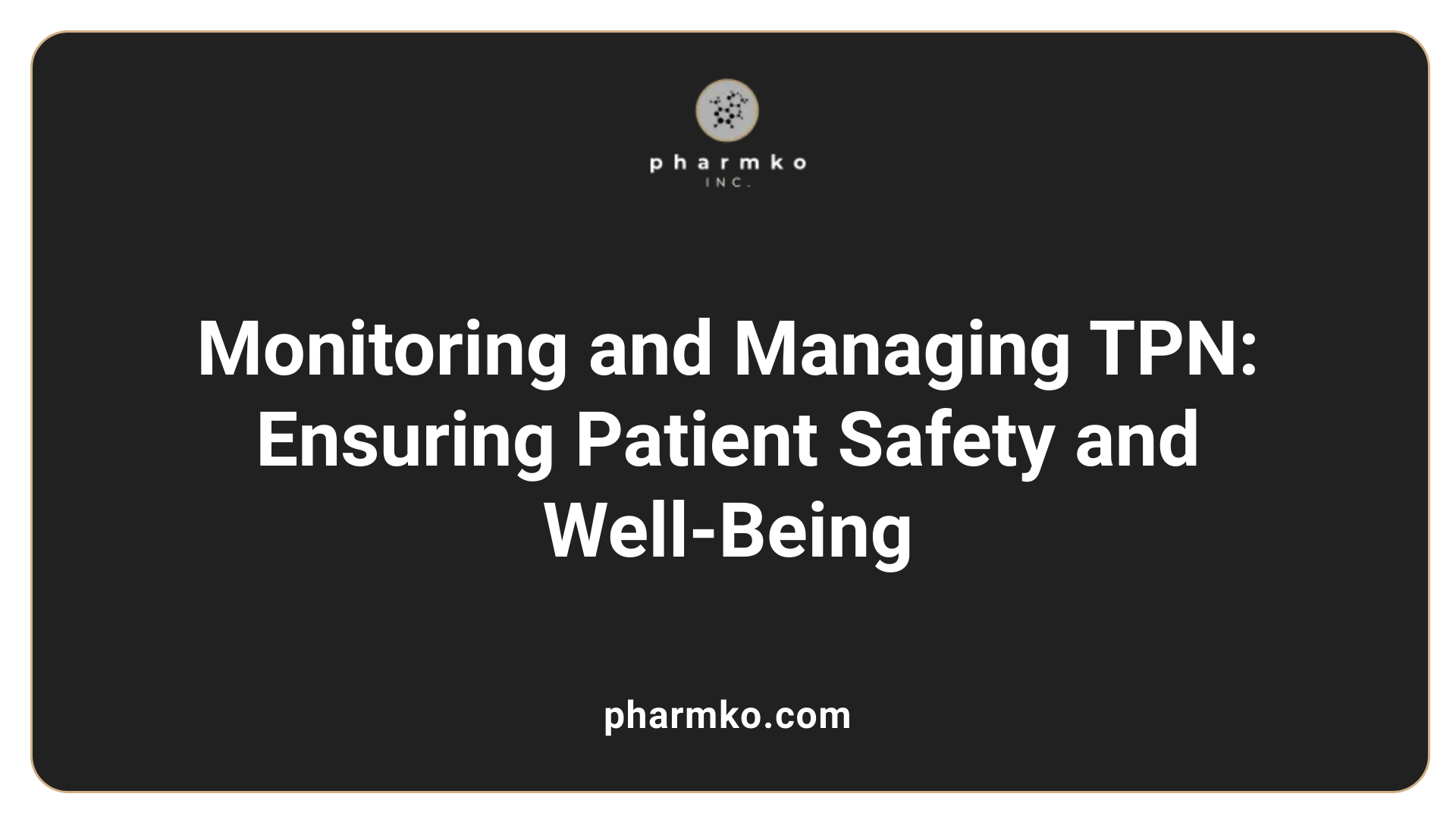
How should monitoring and potential complications be managed during TPN treatment?
Monitoring during Total Parenteral Nutrition (TPN) treatment is crucial to prevent complications such as refeeding syndrome, hyperglycemia, and infections. Regular blood tests should assess the following:
- Electrolyte levels : To check for imbalances that can lead to heart or muscle issues.
- Liver function : Monitoring enzymes helps catch any liver damage early.
- Blood glucose concentrations : Essential to prevent hyperglycemia or hypoglycemia, which can destabilize health status.
Healthcare providers need to stay alert for signs of metabolic imbalances and infections, particularly central line-associated bloodstream infections (CLABSIs). This requires strict adherence to hygiene protocols during TPN administration to minimize risks.
Nutritional formulas must be individualized based on patient needs. Adjustments to the TPN solution should be made promptly by the healthcare team based on ongoing assessments and lab results. Additionally, monitoring trace elements is vital to avoid deficiencies or toxicities that could result in severe health issues.
Regular assessments
Regular assessments are a cornerstone of TPN management. This includes
- Daily weight checks : To monitor fluid retention or loss.
- Clinical evaluations : To assess physical well-being and signs of possible complications.
Complication prevention
To prevent complications effectively, implement the following protocols:
- Monitor for signs of infection : Be vigilant for symptoms like fever or abnormal redness around catheter sites.
- Adjust nutrition based on lab results : This involves tracking metabolic status closely and individualizing the nutrient mix.
Patient safety protocols
Implementing strict safety protocols is paramount. Ensure
- Education on catheter care : Patients and caregivers should know how to manage the TPN system effectively, such as recognizing signs of complications.
- Hygiene practices : Emphasize thorough handwashing and maintaining a sterile environment around the catheter site.
Choosing TPN Wisely
Deciding on Total Parenteral Nutrition as a course of treatment requires careful consideration of the patient's specific needs and conditions. TPN provides vital support for individuals who cannot use their digestive systems due to various severe medical conditions, and while it presents certain risks, these are outweighed by the potential life-saving benefits when managed correctly. With proper administration, monitoring, and a skilled healthcare team, TPN is an invaluable resource in the treatment of critical digestive issues, allowing patients to recover and maintain nutritional stability.
References
- Parenteral Nutrition: What it Is, Uses & Types - Cleveland Clinic
- Total Parenteral Nutrition - StatPearls - NCBI Bookshelf
- Total Parenteral Nutrition (TPN) - Aurora Health Care
- Total Parenteral Nutrition (TPN) - Advocate Health Care
- Total Parenteral Nutrition (TPN) Frequently Asked Questions
- [PDF] The Hitchhiker's Guide to Parenteral Nutrition Management for Adult ...
- Enteral and Parenteral Nutrition
- Total parenteral nutrition: MedlinePlus Medical Encyclopedia
- recognizing the scope and limits of total parenteral nutrition - PubMed
- TPN Contraindications: What You Need To Know



